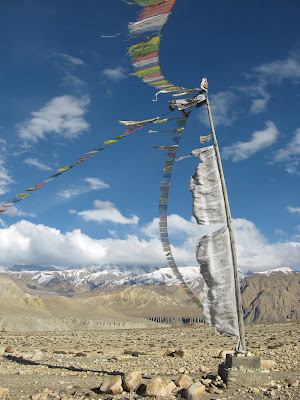རྟིན་འབྱུང
Trenjung: A Journal of Interconnections
December 20, 2012
1.
Because in essence everything is interconnected, it doesn’t matter when or where one begins. As such I will begin, in a somewhat desultory fashion, a few years back, in the Kingdom of Lo on the Tibetan Plateau. Lo is in the rainshadow of the Himalayas and screened as it is by the highest guardians on Earth, it is at the mercies of the gods and goddesses who either bring the rain or don’t, and often don’t which means more often than not it is the melting snow and disappearing glaciers which nourish what can be nourished: the Yaks, the goats and sheep, the occasional precious field of barley, the monks and nuns -holy protectors of the Dharma- the King and his sons, and their lovely consorts, and of course the Lobas, as the residents of Lo call themselves.
"The Himalayas are known as the Water Tower of Asia, and if this role is understood and protected, they will still be able to largely play that role in the future when the demand for water in this region will be even greater than it is now. The alternatives, even in relatively conservative scenarios, are not good."
I naively thought all it took was a little good information to make a course correction or at the least undo the build-up of further momentum toward catastrophe. So I was saddened to read some 5 years later, when I was on the so-called "Water Team" of the State Department back at its monstrosity of a confused headquarters in Foggy Bottom, District of Columbia, that one village in Lo, was considered the first to have been abandoned because of climate change, creating the world's first climate change refugees .
2.
The good thing about interconnections, of course, is that because everything is interconnected with everything else, in ways both imaginable and more often than not, almost unimaginable, one may proceed willy-nilly in the best butterfly fashion to hop from one topic to another with thought neither of the morrow nor of the proceeding sentence. For a clumsily stumbling chronicler like myself, this is a most liberating metaphysical framework to gad about in. Which leads me to Japan. Which leads me to Afghanistan, which leads me to a little cabin I had built in the woods on Puget Sound's Elk Inlet long ago which leads me to dropping out of Reed College to hop freight trains, which leads me to Glacier National Park which is where one Spring Break my hobo-student buddies and I had hopped trains from Portland, which park is now rapidly becoming Loss of Glaciers National Park. And all of these stories of course could be approached from any which direction, in any which way whatever, and they would still be arrived at. It is, as the Chinese say, turtles all the way down.
Now I am old enough, to remember the heavy snows of my St Louis childhood. Here in Washington DC, my 3 year old daughter, Woesem Lhamo, and I glue our eyes to the window at the first promise, hint, teasing potential enticement of snow, planning all the things we will do when it comes. And it almost always doesn't, there being instead a far greater chance of the cherry blossoms blooming in December and bulbs coming up in January. This change, is so obvious for one of my chronological decrepitude, and yet the world I knew of a rather gentle and orderly procession of the seasons, is one she will never know. I think of the Tibetan blood in her, and hope, lover of the mountains that I once was, that she has Tibetan lungs in her to breathe in great swathes of the almost nothingness that reigns on high. But I dread the day I have to tell her that I, or at least my country, and other countries, too, yes, were responsible for despoiling a near paradise, and inflicting desert on the high plateau from which she at least in part, hales. Oh, I did try to write about our responsibility, but who, after all, reads anymore or is moved by words, obscure, distant, pleading words?
